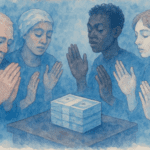When Linet Masai and I became siblings
When the athletes came round the final bend, our girl looked a distant third, her energy seemingly spent. The expected winner, from Ethiopia, began sprinting away and building a supposedly insurmountable lead. But somehow the Kenyan runner, against all the odds, found a final reserve tank and moved into higher gear. She began a frantic dash to the line. Still, no one really thought she would make it.
Then Linet Masai blazed past her rivals inches to the tape of the 10,000 metres final in the just-concluded World Athletics Championship. Kenya struck gold. And I have to confirm that although I was sitting alone on my sofa, I leaped up in joy and shouted with delight as though I was sitting in the Berlin Olympic stadium itself.
Patriotism is a strange thing, is it not? Ms Masai and I do not share a religion, a skin colour, or a culture. We have never met, and probably never will. Yet, during those few seconds, none of that mattered in the slightest. We were ecstatic together, we were like brother and sister, simply because something called “our country” had won a race.
During the same championship, I saw a man named Gregory Konchellah and a man named Bernard Lagat, amongst others, also take to the podium to collect medals. But these gentlemen, though born and bred in Kenya, were not collecting on behalf of Kenya. They have shed their birthplaces and birthrights to become naturalised citizens elsewhere.
I found myself watching them with pain and anger. I found myself asking, “How does it feel, gentlemen, to have another country’s national anthem playing to record your win? How does it feel to have abandoned your roots, your brethren, your locales in pursuit of pieces of silver? With whom will you share a celebratory meal, and what will you eat? And (in Konchellah’s case), how does it feel to be forced to abandon your given name?
I also questioned the Bahrains and Qatars of this world. If you do not have any God-given talent in athletics, do not have the climate or the terrain in which to develop it, are not willing to put in the hard work to grow your own winners – does it give you any joy just to go out and buy the winners? Why do you maintain the pretence that those you buy have become members of your religion and heartfelt citizens of your land? Can you really feel any sense of accomplishment on the track, when you are only able to do this because oil was found under your sands – no effort needed?
And yet there is always another side to everything. That is why I rarely write this column immediately after an event has occurred. Sleeping on things helps, and the passing of days offers emotional distance and a degree of wisdom.
Let us not be unnaturally hard on our athletes, when we know that there are possibly two million “Kenyans” out there, most of them illegally so. Our renegade runners are not alone in chasing dollars and petrodollars. They are merely going in pursuit of what their own country fails to give them – opportunity, advancement, dignity and acceptance.
The fault lies with the country, not the emigrant. Throughout history diasporas have grown all over the planet. The biggest factors driving them out of their borders are insecurity, pestilence, poverty, overcrowding and lack of hope. In Kenya, we have a growing problem in this regard: we are unable to make this a good country for many of our young people to want to live in.
This came home to me very acutely some years ago, when I addressed a group of young people in their late teens. I asked a question: “How many of you, if given the chance, would leave Kenya and settle elsewhere?” I was shocked to see that nine out of ten of the youngsters put up their hands. And that was during the time when our economy was growing at 5-7 per cent. I note that in those days we thought there were a million Kenyans abroad; now we estimate that number may have doubled.
Those who lead this country should be very ashamed. For all our grand plans and grandiose strategies, what we have is a country that young people want to leave in droves. Sure, if you have wealth and assets here you wouldn’t want to be elsewhere. But for most people life in Kenya is a prison of poverty, one that they can’t see a way out of. That is why they are so ready to sing other anthems.
Which is why we have to shed our outdated ideas about nationality and patriotism, and learn to compete with the world to retain talent. It is time to make this a country people CHOOSE to live in. Let us think very hard about our young people and the life we offer them. More on that theme next week.

Buy Sunny Bindra's new book
The X in CX
here »
Popular Posts
- The pause that saves usJune 8, 2025
- Where are you rushing to—your funeral?June 29, 2025
- How to spot a real thinkerJune 15, 2025
- Built the app, forgot the flowJune 22, 2025
- The first push is the hardestJune 1, 2025















